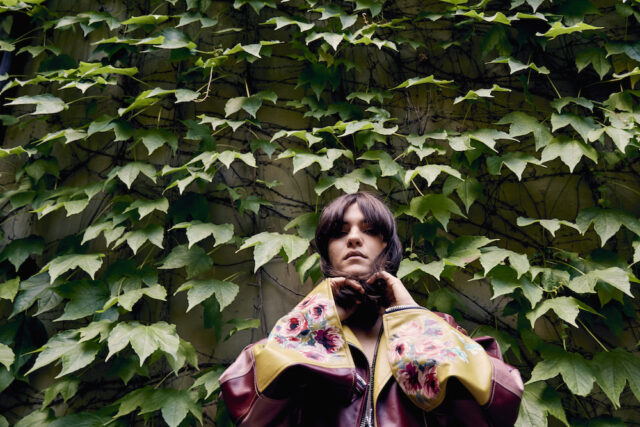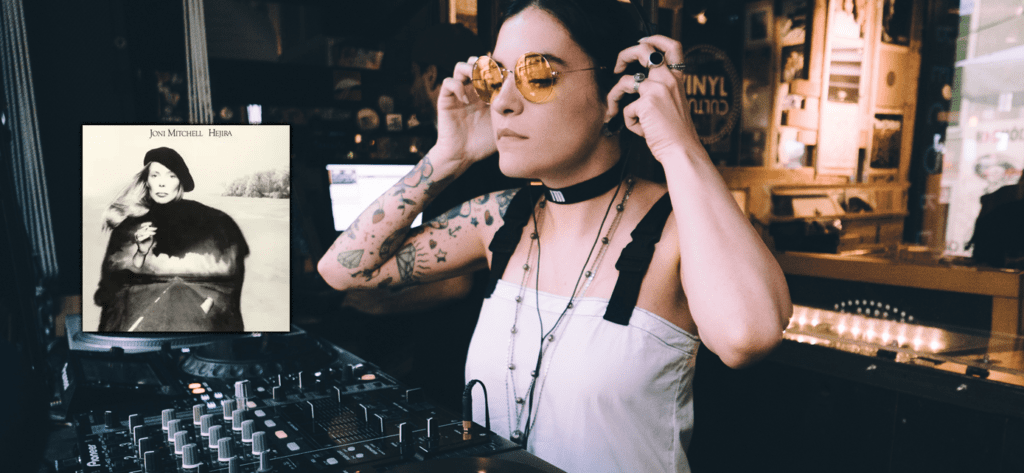Permanent Rotation is a series in which producers, DJs, and musicians go deep on the albums that have inspired them.
Amid the glut of clobbering, super-speedy productions that have dominated the techno scene over the past few years, Sardinian producer and DJ Elisa Bee stands out as something of a classicist. Influenced by the austere and acid-streaked compositions that characterised the early days of Detroit techno, Bee imparts enough of her personality to update the formula, from her ravey, bleep-fused releases on Balkan Vinyl and Dance Trax to her deep and soulful cuts on Hardgroove and Stolen Goods. Her chosen record couldn’t be further from the music she is known for producing and playing, but its themes and the artist behind it have long resonated loudly with Bee.
Elisa Bee grew up in a tiny town about six kilometres outside Alghero, on the northwest coast of Sardinia, Italy. “It’s one of the smallest villages in Sardinia,” she says. “There’s like two bars, the church, the primary school, and that’s it.”. Even in Alghero, with around 45,000 inhabitants, there was just one (now-closed) music store when Bee was growing up, owned by a guy who was “in a bad mood all the time.”
Still, it was Bee’s only outlet for popular culture, and she spent all her money on CDs there. “The selection in this record store was a disgrace,” she says. But upon stumbling across a compilation of Joni Mitchell’s greatest hits, she fell in love at first listen. “I was like, oh my god, the voice is just calling you,” she says. Bee started discovering jazz around the same time and was especially fond of the work of virtuoso bassist Jaco Pistorius. When she found out that Pastorius played bass on Mitchell’s eighth record Hejira, she knew she had to hear it immediately. It wasn’t until a few years later when she picked up the record on vinyl, that Bee felt like she finally understood it.
“Joni Mitchell was with me throughout my life, and earlier on I was listening to maybe more easy [accessible] stuff, like Blue, which is still so deep, another amazing record, and many others,” she says. “At some point, I was mature enough to appreciate Hejira, and when the moment arrived, it was like, wow, because you understand the depth of the artist, and Pastorius is at his best on the record, in my opinion.”
Hejira, released in 1976, is a travelogue chronicling the fallout from Mitchell’s cross-country road trips in the year prior. Running away from a cocaine addiction picked up while on tour with Bob Dylan, and a solo tour that unravelled midway through due to tensions with her lover/drummer John Guerin after she had an affair with Sam Shepard, the final instalment of Mitchell’s wild journey across the US and back (partly with a former lover and a lover in waiting, and partly on her own) involved plans to kidnap her ex’s daughter, red wigs and assumed identities and a habit-curing experience with the Tibetan Buddhist master Chogyam Trungpa. The long drives and motel stays provided a fertile landscape for her guitar-led musings on relationships, success, solitude, and the tug between her career and more traditional womanly pursuits.
As an international touring DJ who regularly travels abroad for work, the viewpoint of the solitary wandering woman was one that Bee could relate to. “I read this interview where she [Mitchell] said there is no pleasure in travelling, it’s more like discovering yourself, and this is true for me,” says Bee. “Playing is one of my favourite things in the world, I love it, but the rest… maybe you’re alone and the plane is late and you’ve slept two hours but you discover many things about yourself — it’s real. Also when you’re flying, your time is spent contemplating people, situations, and landscapes, and it’s a kind of meditation.”
It was, in fact, the solitary nature of DJing and production that drew Bee to a career in electronic music. While she grew up an avid fan of all kinds of music, producing and DJing was something she could do on her own which was something of a necessity in the small town where she grew up. Lugging her own equipment around the island, however, before she eventually moved to Milan, proved challenging. “I had to buy everything, CDJs, mixer, tables, monitors,” she says. “And I used to travel around with all this super heavy gear alone, and that’s how I learned to properly build a stage from scratch.”
When Bee first started DJing around 2007, she would incorporate more of her eclectic tastes into her sets. “I used to play for six or eight hours and I’d be starting with Erykah Badu and finishing with Simian Mobile Disco,” she says. She eventually gravitated towards techno and house, although those genres comprise only 20% of her record collection, she says. All the rest is “stuff like this” [Hejira], and a lot of jazz and instrumental music. “For me, listening to records is more like a ritual,” Bee says. “There’s something you can touch, the record, and taking it out and putting it on, to me it’s more like a Japanese tea ceremony.”
The arrangements on Hejira are simple yet complicated, revolving largely around Mitchell’s voice and guitar and Pastorius’ fretless bass (written on the road, the album was Mitchell’s first not to feature piano). “It takes you to a state of trance in some places, and the lyrics are like poetry,” says Bee.


All nine tracks on the record are long (around six minutes on average), and dense with lyrics. To appreciate them properly requires focused deep listening. “It’s a topic that is really important for me because I think that attention is the highest form of love,” says Bee. “It takes time to enjoy a record like this, because it takes a lot of attention.”
Bee might put on other Mitchell records when feeling low, she says, but the dreamy and ethereal nature of Hejira means she listens to it more often, around twice a month to this day. Mitchell is said to have felt inspired following her split with Guerin, “without the sense of failure that accompanied the breakup of my previous relationships,” she said. “I felt that it was not necessarily anybody’s fault. It was a new attitude.”
Bee is “super against failure as a concept,” she says — definitely a healthy quality to have as an artist. “If something goes wrong, you do another thing, you change, you grow,” she says. “If it was up to me, I’d erase the word failure from the dictionary.”
Elisa Bee recently released the “Mythos” single in partnership with Italian sportswear brand Diadora. Her collaborative EP with Rolando is due to be released later this year.
